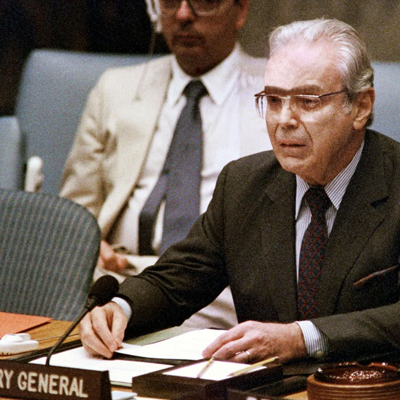Positive Peace: We already know what to do (and have known for some time)
January 15, 2024

January 15, 2024

Curiously, a vital part of human experience—learning to live together—has been badly neglected throughout the world.
Carnegie Commission on Preventing Deadly Conflict, 1997
After the end of the Cold War there seems to have been a moment when many organizations and informed people looked seriously and in depth at the problem of peace, and as we will outline here, they produced important insights into the direction our planetary society should take. However, at first glance that moment seems to have passed, since today our planet is still as much falling apart as coming together. The “blue ribbon” commission of scholars and analysts, cited above, is one example among others of thinkers who concluded decades ago that finding and implementing a more effective approach to cooperation—in effect, a model of proactive, positive peace—is not a pious hope but rather a critical evolutionary threshold for our species. Peace-building is not so much about restoration as about transformation. Something new must be created, both outwardly in terms of institutions, and inwardly, in terms of values and culture.
Serious efforts to meet contemporary challenges must necessarily part with thinking frozen in the perennial division of “us” versus “them”. After all, the planet is small, the world economy, ecosystem and media sphere are one, and as far as we know (so far) we are the only intelligent life in the immediate cosmic vicinity. It is also essential to free oneself from what some have called the “pessimistic inevitability” school of thinking about world affairs; i.e. the view that human nature is inherently aggressive, violent and acquisitive. This kind of political “Realism” sees the world as divided into separate, self-regarding, nation-states that are constantly engaged in a struggle for dominance. In such a world, there is an unending quest for “national security” and, economically, each state seeks to accumulate and exploit resources in a zero-sum game where one state’s gain is another state’s loss. Societies are held together by a narrow conception of nationalism, often buttressed by a profound fear of “the other”, whether another ethnic/communal group, another religion or another ideology: a mindset that has, over the past century, been hugely costly in human terms. However, while this negative image of human nature and its consequences for collective behavior have been with us for centuries, it is not, in light of more recent research in various fields, very convincing. No dark or bloody period of human history should be considered sufficient proof of the basic tenets of political Realism.
As for the states system itself, its limitations are increasingly obvious to any serious observer. While still reciting the mantra of national sovereignty, states today find themselves immersed in a “web of interdependence” at all levels, and carried along by the tides of an accelerating, though uneven, globalization. The great challenge for states today is not dominance, but simply learning to live together in a limited space with limited resources.
To be relevant to our era approaches to peace need to speak to both the spiritual/inner life of the individual and the increasingly global scope of social change—that which connects us all as human beings. We need a deeper and more widespread commitment to justice, a much broader and more profound sense of empathy for all other beings and a rapidly burgeoning sense of community if our planet and its inhabitants are to survive, let alone prosper.
This is what many have called “positive” peace, as opposed to peace as simply the absence of violent conflict. As mentioned earlier there has been a consensus for decades among human needs theorists, human rights advocates, international organizations concerned with development and peace researchers about the requisite qualities of such a new social order. Consider the United Nations Development Program’s (UNDP) “five aspects of sustainable development” put forth in 1997:
This parallels advances in the theory and practice of human rights. The Cold War division between the Capitalist camp’s emphasis on civil and political rights and the Socialist/Third World preference for social, economic and cultural rights has been recognized as unhelpful and divisive. All major areas of human rights (civil and political, economic, social and cultural) have been acknowledged by the international community (however grudgingly in some cases) as an indivisible whole. However, as indicated above, rights and the improved quality of individual and collective life they represent cannot simply be legislated into existence; an understanding reflected in the emphasis by many activists and organizations on a “cultural” approach to the problem. Consider the following samples of such initiatives from the 90’s and late 80’s:

In 1996 the World Commission on Culture and Development drew some far-reaching conclusions from this burgeoning consensus. They believed it provided strong evidence that there was a discernible “global civic culture” from which important elements of global ethics could be derived According to the commission, global ethics derive from:
General principles denoting the fundamental moral concern that in a social and political community ought to find adequate reflection….the basic moral concern – to protect the integrity and to respect the vulnerability of human beings — is universal in its appeal and can be shown to be part of all major traditions of moral teaching…
In their own formulation, they put forth five principal ideas that should form the core of global ethics:
Finally, consider this view expressed in a UNESCO peace education training manual in 1994:
The peace we endeavor to promote has no boundaries. It is a global human outlook which seeks for others what one seeks for oneself. It is not a national issue but a universal one. Peace encompasses an inner feeling of empathy and compassion to which all religions subscribe. It underlies the continuous effort needed to foster equitable economic and cultural relations of a given society and between States. Peace rejects power as the primary arbiter of human relations. Peace accepts the inevitability of change but does not resort to violence to change the process of events and redress inequalities.
There is also a consensus that dialogue is the only way forward. The need for dialogue among peoples arises from the burgeoning recognition, as briefly outlined above, that our changing reality requires a new global ethic and a new perception of one another. Historically, unequal power relations have marred cultural contact among civilizations. All have much to gain from moving away from such postures and leaving behind the unfortunate and dangerous “clash of civilizations” mind set. Only through a true dialogue among peoples can we create new perceptions of one another and lay the foundations for a new global ethic that will make our world safer for diversity.
For at least twenty years, as argued above, “we” have known what to do, but have been held back by fear of change, attachment to the status quo and vested interests—and we can see the consequences of this vacillation every day in the headlines. The question remains: can we learn from an increasingly dark global agenda and move with conviction, consensus and commitment toward a more viable future?
Written by Charles O. Lerche
2020 Global Governance Forum Inc. All Rights Reserved